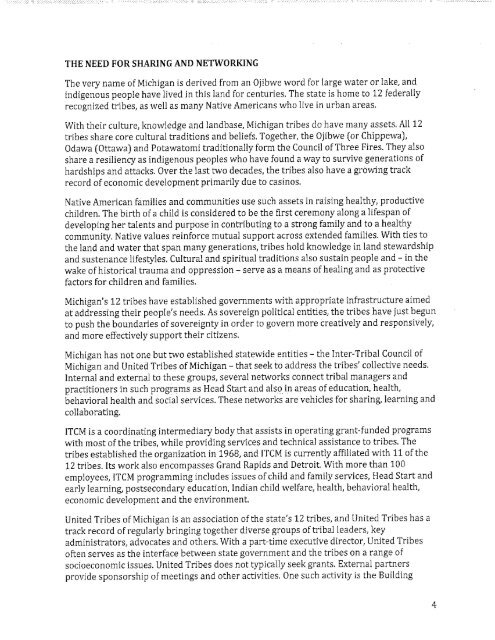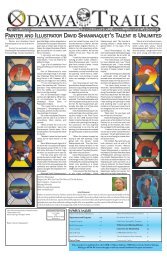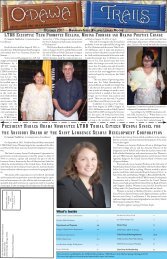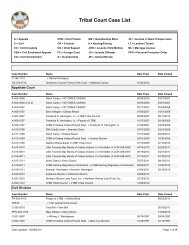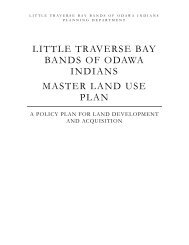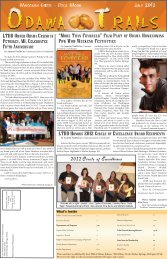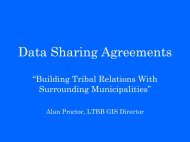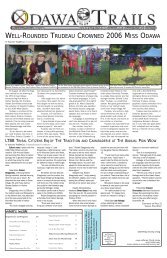United Tribes ) Michigan - Little Traverse Bay Bands of Odawa Indians
United Tribes ) Michigan - Little Traverse Bay Bands of Odawa Indians
United Tribes ) Michigan - Little Traverse Bay Bands of Odawa Indians
You also want an ePaper? Increase the reach of your titles
YUMPU automatically turns print PDFs into web optimized ePapers that Google loves.
THE NEED FOR SHARING AND NETWORKING<br />
The very name <strong>of</strong> <strong>Michigan</strong> is derived from an Ojibwe word for large water or lake, and<br />
indigenous people have lived in this land for centuries. The state is home to 12 federally<br />
recognized tribes, as well as many Native Americans who live in urban areas.<br />
With their culture, knowledge and landbase, <strong>Michigan</strong> tribes do have many assets. All 12<br />
tribes share core cultural traditions and beliefs. Together, the Ojibwe (or Chippewa),<br />
<strong>Odawa</strong> (Ottawa) and Potawatomi traditionally form the Council <strong>of</strong> Three Fires. They also<br />
share a resiliency as indigenous peoples who have found a way to survive generations <strong>of</strong><br />
hardships and attacks. Over the last two decades, the tribes also have a growing track<br />
record <strong>of</strong> economic development primarily due to casinos.<br />
Native American families and communities use such assets in raising healthy, productive<br />
children. The birth <strong>of</strong> a child is considered to be the first ceremony along a lifespan <strong>of</strong><br />
developing her talents and purpose in contributing to a strong family and to a healthy<br />
community. Native values reinforce mutual support across extended families. With ties to<br />
the land and water that span many generations, tribes hold knowledge in land stewardship<br />
and sustenance lifestyles. Cultural and spiritual traditions also sustain people and - in the<br />
wake <strong>of</strong> historical trauma and oppression - serve as a means <strong>of</strong> healing and as protective<br />
factors for children and families.<br />
<strong>Michigan</strong>'s 12 tribes have established governments with appropriate infrastructure aimed<br />
at addressing their people's needs. As sovereign political entities, the tribes have just begun<br />
to push the boundaries <strong>of</strong> sovereignty in order to govern more creatively and responsively,<br />
and more effectively support their citizens.<br />
<strong>Michigan</strong> has not one but two established statewide entities - the Inter-Tribal Council <strong>of</strong><br />
<strong>Michigan</strong> and <strong>United</strong> <strong>Tribes</strong> <strong>of</strong> <strong>Michigan</strong> - that seek to address the tribes' collective needs.<br />
Internal and external to these groups, several networks connect tribal managers and<br />
practitioners in such programs as Head Start and also in areas <strong>of</strong> education, health,<br />
behavioral health and social services, These networks are vehicles for sharing, learning and<br />
collaborating.<br />
ITCM is a coordinating intermediary body that assists in operating grant-funded programs<br />
with most <strong>of</strong> the tribes, while providing services and technical assistance to tribes. The<br />
tribes established the organization in 1968, and ITCM is currently affiliated with 11 <strong>of</strong> the<br />
12 tribes. Its work also encompasses Grand Rapids and Detroit. With more than 100<br />
employees, ITCM programming includes issues <strong>of</strong> child and family services, Head Start and<br />
early learning, postsecondary education, Indian child welfare, health, behavioral health,<br />
economic development and the environment.<br />
<strong>United</strong> <strong>Tribes</strong> <strong>of</strong> <strong>Michigan</strong> is an association <strong>of</strong> the state's 12 tribes, and <strong>United</strong> <strong>Tribes</strong> has a<br />
track record <strong>of</strong> regularly bringing together diverse groups <strong>of</strong> tribal leaders, key<br />
administrators, advocates and others. With a part-time executive director, <strong>United</strong> <strong>Tribes</strong><br />
<strong>of</strong>ten serves as the interface between state government and the tribes on a range <strong>of</strong><br />
socioeconomic issues. <strong>United</strong> <strong>Tribes</strong> does not typically seek grants. External partners<br />
provide sponsorship <strong>of</strong> meetings and other activities. One such activity is the Building<br />
4


